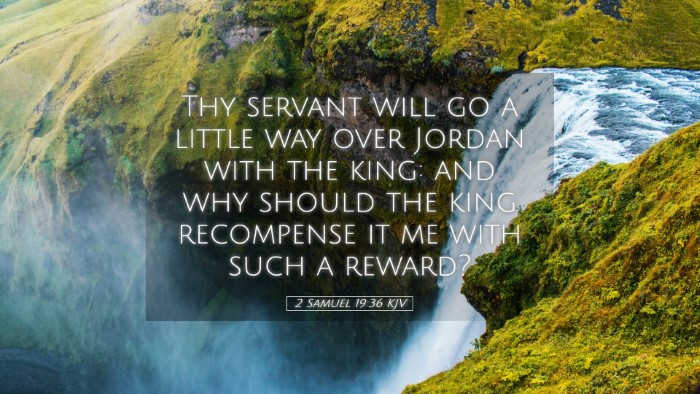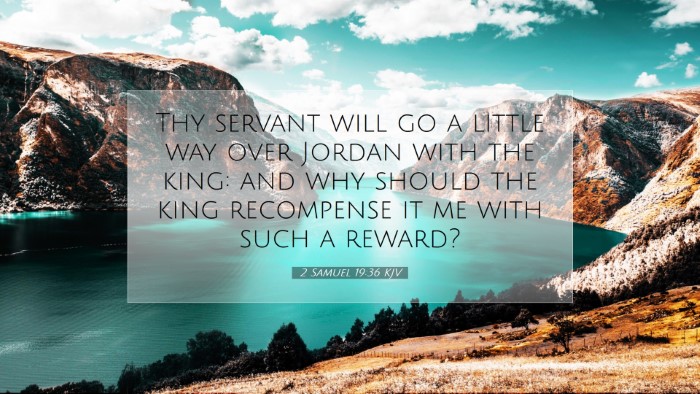Commentary on 2 Samuel 19:36
Verse Text: "And your servant will go a little way across the Jordan with the king. Why should the king repay me with such a reward?"
Introduction
In this poignant verse from 2 Samuel, we encounter a significant moment that encapsulates themes of loyalty, service, and the glories and hardships of kingship. The words of Barzillai the Gileadite reveal the heart of a faithful servant who, despite his old age and incapacity, expresses a desire to accompany King David back to Jerusalem. This commentary synthesizes insights from esteemed public domain theologians, framing the theological and practical implications of the verse for modern readers, particularly pastors, students, and Bible scholars.
Contextual Overview
The events surrounding 2 Samuel 19 are steeped in the aftermath of Absalom's rebellion, where King David faced the turmoil of civil war and personal loss. Barzillai, a wealthy and aged man from Gilead, had provided David with sustenance during his flight from Absalom. As David returns to reclaim his throne, Barzillai's expression of willingness to follow him across the Jordan raises deep questions about loyalty and sacrifice.
Verse Analysis
1. The Character of Barzillai
Barzillai represents a model of unselfish service. As noted by Matthew Henry, his generosity during King David's time of flight illustrated a profound loyalty that extended beyond mere financial support. He acted with integrity and kindness, which solidified his reputation as a true friend of the king.
2. The Significance of the Jordan River
The crossing of the Jordan carries rich symbolism. It represented both a transition and a threshold between wilderness and promise, as highlighted by Adam Clarke. Barzillai's willingness to traverse this boundary underscores his readiness to partake in the mission and destiny of David's reign, but also the reality of the inevitability of separation and mortality.
3. Questions of Reward and Acknowledgment
Barzillai's rhetorical question, "Why should the king repay me with such a reward?" indicates a humility that reflects a deep understanding of service. Albert Barnes points out that Barzillai's motives were not driven by a desire for reward but rooted in genuine affection for David. Such insight teaches the modern church the value of serving without expectation.
Theological Reflections
1. Servanthood in Ministry
Barzillai’s actions resonate with the New Testament's themes of servanthood. His selfless approach serves as a precursor to the motivations encouraged in the life of a believer. It compels contemporary leaders to seek the welfare of others, exemplifying Jesus' teaching against seeking personal gain in service.
2. The Nature of Divine Reward
The question posed by Barzillai prompts reflection on divine reward versus earthly acknowledgment. This notion echoes throughout scripture, where the faithful servant may often seem overlooked. The assurance of God's eventual reward, as noted by Matthew Henry, reinforces the necessity for faithfulness in obscurity, fostering perseverance among believers facing hardships in their callings.
3. The Reality of Aging and Inability
Barzillai’s lament of his old age brings to light the reality of human limitations. His honest reflection on his capacity to serve emphasizes the need for churches to include and honor the elderly and those who feel inadequate. As modern scholarship discusses the role of aging in ecclesial contexts, Barzillai stands as a testament to the enduring value of wisdom and experience, regardless of physical ability.
Practical Applications
1. Encouragement for Caregivers and Supporters
Barzillai’s generous heart should inspire those who support leaders within the church community. It serves as an exhortation to honor the quiet, significant contributions of those who serve in the background, reaffirming that all roles contribute to a greater divine purpose.
2. Embracing Transitions with Faith
The crossing of the Jordan symbolizes the transitions in a believer's life. It encourages a posture of readiness, akin to Barzillai’s, to follow God’s leading into new areas of service or ministry. Leaders are reminded to prepare their congregations for such transitions with faith and hope in God’s overarching plan.
3. Cultivating a Culture of Humility
The humility exhibited by Barzillai is a vital lesson for contemporary church leaders. The avoidance of self-aggrandizement, coupled with genuine service, can cultivate a culture that reflects Christ's servant heart. Emphasizing the importance of community service as a platform for discipleship can inspire future generations of learners and leaders.
Conclusion
2 Samuel 19:36 encapsulates a profound moment of humility, service, and the complex nature of relationships in leadership contexts. Barzillai, through his willingness to serve without expectation of reward, presents a timeless lesson: that true service reflects the servant heart of Christ. As modern readers engage with this text, they are invited to reflect not only on their own roles but also on how they might better reflect God's love and integrity within their communities.
Further Study Recommendations
- Scholarly Reflections: Engage with additional commentaries that explore ancient Near East customs relating to kingship and service.
- Historical Context: Study the role of Barzillai within the historical narrative of David’s reign for deeper understanding of loyalty amidst adversity.
- Apply Lessons: Consider practical ways to implement Barzillai's values of generosity and humility in ongoing ministry and church activities.


